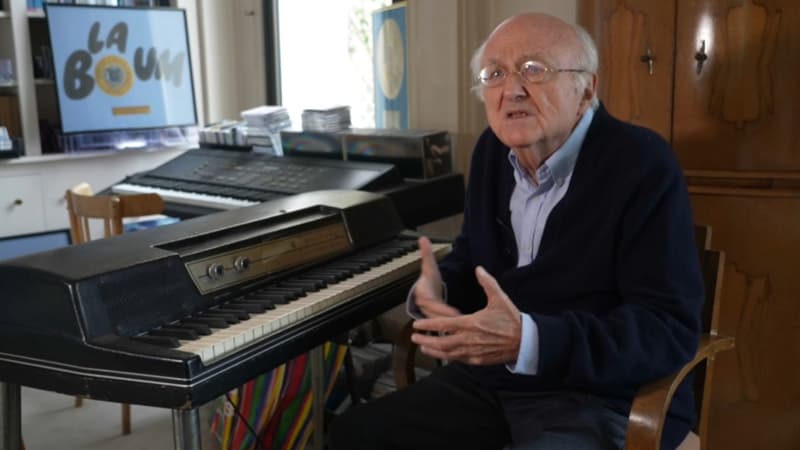He will be in concert at the Seine Musicale on December 6 and 7. Vladimir Cosma, the composer to whom we owe so many unforgettable soundtracks, from Tall blonde with black shoe. to Adventures of Rabbi Jacob, by the way The boomwelcomed BFMTV into their home. It chronicles his career and the creation of some of his most iconic music.
If you have the gift of knowing how to create surprising melodies, your career as a composer for a family of musicians owes nothing to chance.
“During my entire youth I only heard about music, so it seemed natural to me to follow this path,” he confesses. “I was like condemned to making music.”
A former assistant to Michel Legrand, he had to distance himself from the maestro and give a sound identity to the films he scored.
“Michel Legrand really liked big orchestras, so I was forced to follow his musical direction, I wrote arrangements and orchestrations for him. When I started to stand on my own, I told myself that my music had to be different from his, so that people wouldn’t say that I was playing Michel Legrand,” recalls the 85-year-old musician.
“Instead of basing my music on a big orchestra, I tried to find a very specific original instrumental color for each film. Like Pan’s flute in the case of tall blondethe piano, the birds, the sea, in the case ofAn elephant is very deceptive.“.
The history of the music of “Grand blond”.
For The great blondeHe focused on the instrument, the famous pan flute, before finding the subject. And he had to impose it on director Yves Robert, who had a James Bond-style score in mind, since Pierre Richard played the role of a spy.
“I didn’t want to make a pastiche of this,” he recalls, explaining that he was inspired more by an Eastern spy, originally from Romania, than by an Anglo-Saxon spy.
However, the film’s famous theme did not arrive immediately. Vladimir Cosma, pressed for time, first proposed a first theme to Yves Robert, who shot the entire film with him.
“One day, in a taxi, I came up with the idea for the (second) theme. As soon as I found it, I said to myself: ‘this is the theme of the film, it fits perfectly with the instrument.'” But we had to convince Yves Robert, enthusiastic about the first theme, to make this new theme the leitmotiv of the film.
The composer, however, recorded the two songs and transmitted them to Yves Robert. The next day he told me: “I tried both and, indeed, the (second) theme is unbeatable.” However, the second theme remained and appears in certain scenes of the film.
“Music doesn’t tell a story”
About the essence of film music, Vladimir Cosma says that “music is by nature non-descriptive, it does not describe anything, it does not tell a story like the text. It is in people’s heads where this magical mixture between image and music occurs. And they have the strange impression that the music is made for the film. In fact, it is made for itself and subsequently becomes the music of the film.”
“It’s much more difficult to write music for a comedy than for a dramatic film.”
Although he wrote for numerous comedies, the goat to Adventures of Rabbi Jacob passing through The ace of aces EITHER Wing or thighVladimir Cosma believes that “he has never made comic music.”
“Comic music is obtained through pastiche, through a kind of mockery of music, which provokes laughter. I wanted to provoke laughter through the contrast between music that is a little tragic, a little dramatic, with a scene that is intended to be funny.”
If these comedies with which his name and music are eternally associated were the richest era of cinema in the 1970s and 1980s, they also limited Vladimir Cosma to this genre. “In the cinema I was condemned to make comedies,” he recalls, adding that television allowed him to diversify.
This is how he wrote the theme of L‘Love as a legacy of Chateauvallon either burned hearts. “Television brought me new themes that have a different resonance and gave me the possibility of writing completely different music,” explains the composer.
The song “La Boum”, written in a week
For The boomThe musician who has sometimes composed up to 20 film scores a year, was requested while on a “study vacation” in the South and at the same time working in Wing or Thigh AND inspector labavure.
“I had a lot of work and they called me from Gaumont to tell me that they needed me for a quasi-musical film, because there were a lot of songs.”
“We need you to write the title song in a week,” they tell him.
The scene in which young Vic (Sophie Marceau) slow dances to the famous music would be shot the following week, with many extras. “I didn’t like it at all. It was music I wasn’t used to, club music, dance music. I had never written a song,” he remembers.
Faced with his refusal, Gaumont insisted, assuring that director Claude Pinoteau absolutely wanted him to do the music.
“In fact,” says Vladimir Cosma, “they had hired Polnareff to make the music and sing it. But Polnareff had gone to the United States for a while for tax reasons and contact with Pinoteau was tense, (the musician) sent music that did not suit Pinoteau.”
“Time passed and at one point the director asked the production to change the composer and mentioned my name. (Producer) Alain Poiré told me ‘we need it in a week’. It was a request, it wasn’t even a request.”
“I started working on this music, on the electric piano I had with me, and that was it.” This is how it was born realitysung by Richard Sanderson, whose first notes inevitably evoke The boom.
Source: BFM TV


